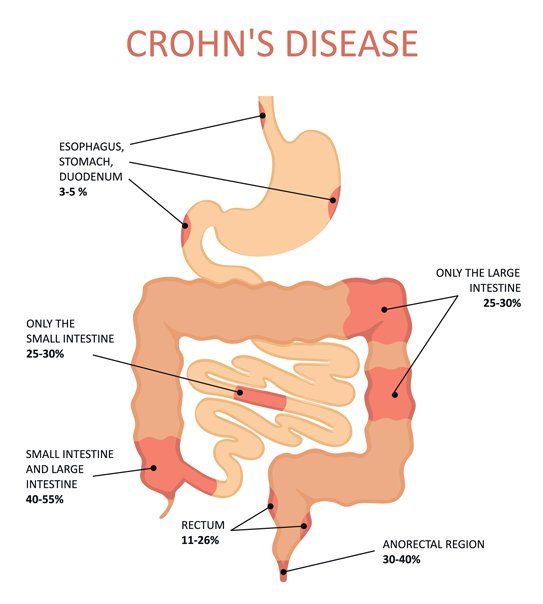People with digestive ailments may miss time at work or school. Some people go out less or stop socializing entirely. Others have difficulty completing their daily tasks and may become housebound when suffering from the most severe symptoms.
Health conditions like Crohn's disease do not have to prevent anyone from living their life. Effective methods of controlling the symptoms do not have to mean surgery or the side effects of prescription medication.
What is Crohn's Disease?
Crohn's disease causes the digestive tract to experience severe inflammation. People with Crohn's experience many uncomfortable symptoms that can worsen as the condition spreads deeper into their bowels.
The disease is debilitating, and if not managed effectively, it can lead to more severe health concerns. The possible risks of Crohn's disease may include ulcers, anal fissures, and cancer. Correct management makes life more enjoyable and can prevent life-threatening complications.
Sign-up today and receive ta FREE Dry Brushing Guide written by Dr. Dana Cohen
What Causes Crohn's Disease?
The medical community does not know the exact cause of Crohn's disease. What is known is that some people may develop the condition after suffering from a virus or a bacterial infection. The trouble arises because sometimes, the immune system overreacts to an infection in the body. The immune system may become overactive and respond by attacking the cells in the digestive tract in addition to the germs causing the original illness.
Other cases of Crohn's disease begin without this type of infection and any detectable problem with the immune system. However, sometimes the individual affected has family members with the same condition or another form of irritable bowel syndrome (IBS). Many in the medical community believe this may mean a hereditary connection is a risk factor.
Who is at Risk of the Disease?
Anyone can develop Crohn's disease. Unfortunately, despite these known risk factors, some patients do not meet any of these conditions and still have the illness. The identified risk factors include:
- Caucasians experience the problem more than people in other ethnic groups.
- Most patients diagnosed with the condition receive their diagnosis before they turn 30.
- A family history of Crohn's Disease or other IBS diseases.
- Smoking cigarettes.
- Overuse of nonsteroidal anti-inflammatory medications like ibuprofen.
Symptoms of Crohn's Disease
Crohn's patients experience the same symptoms as people with other types of IBS and many other ailments. Doctors may require the patient to undergo extensive testing before they diagnose it as Crohn's disease.
The symptoms can vary between patients, and they may change for the individual over time. The condition can also go into remission without treatment, so people may think their recurring symptoms come from a new illness rather than a continuation of a previous problem.
The symptoms can include:
- Diarrhea
- Abdominal cramping
- Fatigue
- Fever
- Reduced appetite
- Weight loss
- Malnutrition
- Blood in the stool
- Anal fistulas causing pain or drainage
- Skin inflammation
- Joint pain and inflammation
- Mouth sores
- Kidney stones
- Anemia
Traditional Medical Treatments for Crohn's Disease
Crohn's Disease treatments through traditional medicine may include steroids, immune-suppressing drugs, and a liquid diet. Patients who do not get better with these options may receive more powerful prescription medications or need surgery to remove inflamed sections of the bowel. Surgery helps to stop symptoms, but it is not a cure and will not stop the progression of the illness.
Natural Holistic Practices for Treating Crohn's Disease
Natural treatment options will include incorporating a healthy diet into the lifestyle with an adapted plan for when the flares arise. During times of flares, the individual will avoid foods that are fatty, spicy, or high in fiber. They should choose low-fiber foods and adequate servings of refined grains and seedless and skinless fruits and vegetables. Other suggestions include:
- Drinking plenty of water every day.
- Eating small meals several times a day.
- Keeping a food journal to find a match between specific foods and flare-ups.
- Avoidance of nonsteroidal anti-inflammatory drugs.
- Not smoking.
- Practicing stress reduction techniques like hypnosis and yogurt.
- Getting regular exercise whenever possible based on health.
- Adding probiotics to the diet through supplementation or foods like sauerkraut or kombucha.
- Adding fish oil to the diet.
- Using acupuncture to reduce inflammation naturally and boost digestive health.
- Increasing herb and botanical supplementation.
- Undergoing biofeedback to understand better how the body responds to pain for better control.
Contact Dr. Dana Cohen MD for Your Personalized Crohn's Disease Treatment and Natural Remedy
The symptoms of Crohn's disease are often too severe to ignore. Remission can fool people into believing they are better, but the illness will recur. Dr. Dana Cohen can help people ease their symptoms and keep their disease under control throughout life. The control lets people avoid the complications that could arise if the disease remains unmanaged. Contact the doctor today to schedule an appointment to discuss your symptoms and develop a treatment plan that will meet your needs.
Please contact Dr. Cohen today!












